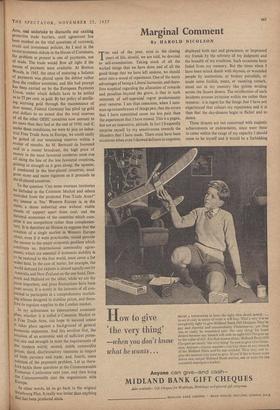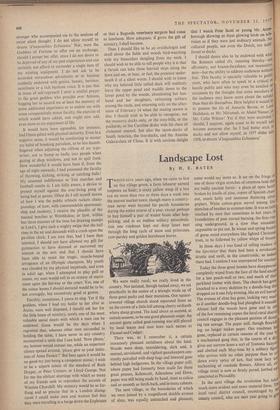Marginal Comment
By HAROLD NICOLSON Ttie end of the year, even as the closing years of life, should, we are told, be devoted to self-examination. Taking stock of all the wicked things that we have done and of all the good things that we have left undone, we should enter into a mood of repentance. One of the many advantages of being a Liberal humanist, and there- fore sceptical regarding the allocation of rewards and penalties beyond the grave, is that in such moments of self-appraisal regret predominates over remorse. I am thus conscious, when I sum- mon up remembrance of things past, that the errors that I have committed cause me less pain than the experiences that I have missed. This is a pagan, but not an insensitive, attitude. In fact I frequently surprise myself by my sensitiveness towards the blunders that I have made. There must have been occasions when even I showed deftness in response, displayed both tact and prescience, or impressed my friends by the sobriety of my judgment and the breadth of my erudition. Such occasions have faded from my memory. But the times when I have been struck dumb with shyness, or wounded people by inattention, or broken porcelain, or made some foolish, mean, or vaunting remark, stand out in my memory like pylons striding across the Sussex downs. The recollection of such incidents arouses irritation within me rather than remorse : it is regret for the things that I have not experienced that colours my repentance and it is then that the day-dreams begin to flicker and to dance.
These dreams are not concerned with majestic achievements or endowments, since were these to come within the range of my capacity I should cease to be myself and it would be a forbidding stranger who accompanied me to the sessions of sweet silent thought. I do not allow myself to dream 'd'impossibles Ecbatanes.' Nor, were the Goddess of Fortune to offer me an exchange, should I accept her offer, since I do not desire to be deprived of any of my past experiences and can certainly not afford to surrender a single item of my existing equipment. I do not ask to be accorded miraculous adventures or to become suddenly endowed with genius, beauty, heroism, saintliness or a rich baritone voice. It is just that in times of self-reproach I utter a wistful prayer to the great goddess who presides over Antium, 'begging her to accord me at least the memory of some additional experience or to endow me with some comparatively minor faculty, the exercise of which would have added, and might now add, even more to my enjoyment of life.
It would have been agreeable, for instance, had I been gifted with physical dexterity. Even in a negative sense, it would be comforting to master my habit of breaking porcelain, to be less thumb- fingered when adjusting the ribbon of my type- writer, not to bump so badly into people when gazing at shop windows, and not to spill food. How wonderful it would have been if, from the age of eight onwards, I had possessed the faculty of throwing, kicking, striking, or catching balls! My assumed indifference to 'Test matches and football results is, I am fully aware, a device to protect myself against the ever-living pang of being bad at games. Often do I tell myself stories of how I win the public schools rackets cham- pionship; of how, with commendable sportsman- ship and modesty, I receive the plaudits of the massed benches at Wimbledon; or how, within but three minutes of the time for drawing stumps at Lord's, I give such a mighty swipe that the ball rises in the air and descends with a crash upon the pavilion clock. I am sure that, had I been thus talented, I should not have allowed my gift for gymnastics to have dimmed or narrowed my interest in the arts and that I should have been able to resist the tragic, muscle-bound arrogance of an Olympic champion. My youth was clouded by my physical ineptitude, and even in adult age, when I attempted to play golf or tennis, my sons would roll in an ecstasy of merri- ment upon the fairway or the court. Yes, one of the minor boons I should demand would be to be, not averagely, but excessively good at games.
Terribly, sometimes, I yearn to sing. Yet if the goddess, when I lead my heifer to her altar at Anzio, were well disposed, I should ask her for the little boon of mimicry, surely one of the most valuable social Assets with which a man can be endowed. Gone would be the days when I regretted that, whereas other men succeeded in holding the table, I have never in any country encountered a table that I can hold. 'Now please,' my hostess would entreat me, while an expectant silence spread around, 'please give us your imita- tion of Anna Pauker?' But here again it would be no good my just being a competent mimic; I wish to be a superb mimic of the standard of Ruth Draper, or Peter Ustinov, or Lloyd George. Not for me the sibilant slurrings with which so many of my friends seek to reproduce the accents of Winston Churchill. My mimicry would be so far- flung and so precise that in a London dining- room I could make men and women feel that they were travelling in a barge down the Euphrates or that a Buganda veterinary surgeon had come to luncheon. How adequate, if given the gift of mimicry, I shall become.
Then I should like to be an ornithologist and stroll about the fields and woods bird-watching with my binoculars dangling from my neck. I should wish to be able to tell people why it is that a thrush can take three hurried steps along the lawn and see, or hear, or feel, the presence under- 'neath it of a silent worm. I should wish to know why my beloved little tufted duck will suddenly leave the upper pond and waddle down to the lower pond by the woods, abandoning her hus- band and her daughters, swimming solitary among the reeds, and returning only on the after- noon of February 14 when the mating season is due. I should wish to be able to recognise, not the muscovy ducks only, or the rosy-bills, or the pochards, or the Carolina drake with his chest of cloisonné enamel, but also the musk-ducks of South America, the tree-ducks, and the Anatina Galericulata of China. It is with envious delight that I watch Peter Scott or young Mr. Atten. borough showing us these glowing birds on tele- vision as if they were just ordinary animals. No cultured people, not even the Dutch, are indif. ferent to ducks.
I should desire also to be endowed with what the Romans called Os, meaning thereby—not effrontery, not brazen-facedness, not insensitive' ness—but the ability to address audiences without fear. This faculty is specially valuable to politt' clans, who have often to speak to a critical or hostile public and who may even be assailed on occasions by the thought that some members of the audience may know more about the subject than they do themselves. How helpful it would be to possess the Os of Aneurin Bevan, or Lord Hailsham, or Mr. Nkrumah, or Abdul Nasser, or Mr. Colin Wilson! Yet if that were accorded 1 should; I suppose, again cease to be myself and become someone else. So I had better stick to ducks and not allow myself, as 1957 slides into 1958, to dream 'cl'impossibles Ecbatanes.'











































































 Previous page
Previous page